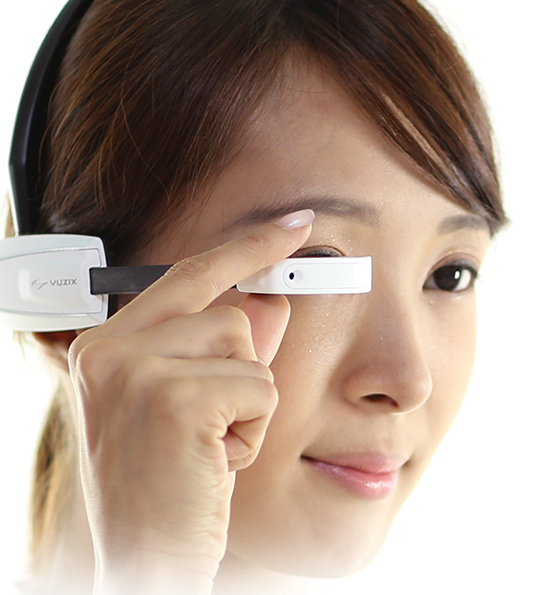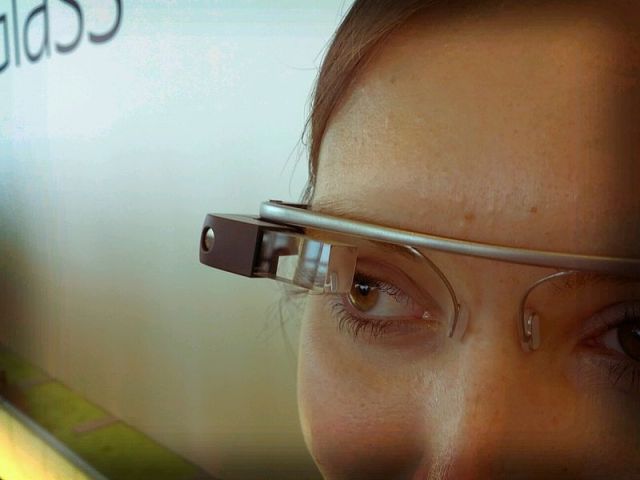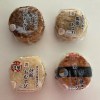Protecting your privacy can be a difficult task in today’s world of information technology. With surveillance cameras on every corner and a recording device on every smartphone, there’s a good chance your image has been captured somewhere without you even knowing it. Safeguarding your mug in the future is set to become even more difficult with advancements in facial recognition technologies and wearable computers like Google Glass.
So what can you do to ensure your identity remains intact? In Western countries the answer would be simple: put on a pair of sunglasses. In Japan, however, sunglasses are a much less common sight, and many consider them to be worn only by those trying a little too hard to look cool, and in more extreme cases associate them with the yakuza lifestyle. Researchers at the National Institute of Informatics in Tokyo have addressed this issue by designing a non-threatening pair of white shades to protect both your identity and your public image, dubbing them the “Privacy Visor”.



 McDonald’s new Happy Meals offer up cute and practical Sanrio lifestyle goods
McDonald’s new Happy Meals offer up cute and practical Sanrio lifestyle goods All-you-can-drink Starbucks and amazing views part of Tokyo’s new 170 meter-high sky lounge
All-you-can-drink Starbucks and amazing views part of Tokyo’s new 170 meter-high sky lounge Beautiful Sailor Moon manhole cover coasters being given out for free by Tokyo tourist center
Beautiful Sailor Moon manhole cover coasters being given out for free by Tokyo tourist center Studio Ghibli glasses cases let anime characters keep an eye on your spectacles
Studio Ghibli glasses cases let anime characters keep an eye on your spectacles Kyoto’s 100 Demons yokai monster parade returns!
Kyoto’s 100 Demons yokai monster parade returns! Hamster abandoned at Tokyo ramen restaurant gets new home
Hamster abandoned at Tokyo ramen restaurant gets new home Starbucks reopens at Shibuya Scramble Crossing with new look and design concept
Starbucks reopens at Shibuya Scramble Crossing with new look and design concept Super Nintendo World expansion gets delayed for several months at Universal Studios Japan
Super Nintendo World expansion gets delayed for several months at Universal Studios Japan Should you warm up your convenience store onigiri rice balls in the microwave?【Taste test】
Should you warm up your convenience store onigiri rice balls in the microwave?【Taste test】 The greatest sushi roll in Japanese history is actually nine sushi rolls in one【Photos】
The greatest sushi roll in Japanese history is actually nine sushi rolls in one【Photos】 Disney princesses get official manga makeovers for Manga Princess Cafe opening in Tokyo
Disney princesses get official manga makeovers for Manga Princess Cafe opening in Tokyo More foreign tourists than ever before in history visited Japan last month
More foreign tourists than ever before in history visited Japan last month Beautiful new Final Fantasy T-shirt collection on the way from Uniqlo【Photos】
Beautiful new Final Fantasy T-shirt collection on the way from Uniqlo【Photos】 Is the new Shinkansen Train Desk ticket worth it?
Is the new Shinkansen Train Desk ticket worth it? Foreign English teachers in Japan pick their favorite Japanese-language phrases【Survey】
Foreign English teachers in Japan pick their favorite Japanese-language phrases【Survey】 Japanese convenience store packs a whole bento into an onigiri rice ball
Japanese convenience store packs a whole bento into an onigiri rice ball We try out “Chan Ramen”, an underground type of ramen popular in the ramen community
We try out “Chan Ramen”, an underground type of ramen popular in the ramen community Studio Ghibli releases Kiki’s Delivery Service chocolate cake pouches in Japan
Studio Ghibli releases Kiki’s Delivery Service chocolate cake pouches in Japan Japan’s bone-breaking and record-breaking roller coaster is permanently shutting down
Japan’s bone-breaking and record-breaking roller coaster is permanently shutting down New definition of “Japanese whiskey” goes into effect to prevent fakes from fooling overseas buyers
New definition of “Japanese whiskey” goes into effect to prevent fakes from fooling overseas buyers Our Japanese reporter visits Costco in the U.S., finds super American and very Japanese things
Our Japanese reporter visits Costco in the U.S., finds super American and very Japanese things Studio Ghibli unveils Mother’s Day gift set that captures the love in My Neighbour Totoro
Studio Ghibli unveils Mother’s Day gift set that captures the love in My Neighbour Totoro Foreign passenger shoves conductor on one of the last full runs for Japan’s Thunderbird train
Foreign passenger shoves conductor on one of the last full runs for Japan’s Thunderbird train Domino’s Japan now sells…pizza ears?
Domino’s Japan now sells…pizza ears? New Japanese KitKat flavour stars Sanrio characters, including Hello Kitty
New Japanese KitKat flavour stars Sanrio characters, including Hello Kitty Kyoto creates new for-tourist buses to address overtourism with higher prices, faster rides
Kyoto creates new for-tourist buses to address overtourism with higher prices, faster rides Sales of Japan’s most convenient train ticket/shopping payment cards suspended indefinitely
Sales of Japan’s most convenient train ticket/shopping payment cards suspended indefinitely Sold-out Studio Ghibli desktop humidifiers are back so Totoro can help you through the dry season
Sold-out Studio Ghibli desktop humidifiers are back so Totoro can help you through the dry season Japanese government to make first change to romanization spelling rules since the 1950s
Japanese government to make first change to romanization spelling rules since the 1950s Ghibli founders Toshio Suzuki and Hayao Miyazaki contribute to Japanese whisky Totoro label design
Ghibli founders Toshio Suzuki and Hayao Miyazaki contribute to Japanese whisky Totoro label design Doraemon found buried at sea as scene from 1993 anime becomes real life【Photos】
Doraemon found buried at sea as scene from 1993 anime becomes real life【Photos】 Tokyo’s most famous Starbucks is closed
Tokyo’s most famous Starbucks is closed One Piece characters’ nationalities revealed, but fans have mixed opinions
One Piece characters’ nationalities revealed, but fans have mixed opinions We asked a Uniqlo employee what four things we should buy and their suggestions didn’t disappoint
We asked a Uniqlo employee what four things we should buy and their suggestions didn’t disappoint Princesses, fruits, and blacksmiths: Study reveals the 30 most unusual family names in Japan
Princesses, fruits, and blacksmiths: Study reveals the 30 most unusual family names in Japan Hamster abandoned at Tokyo ramen restaurant gets new home
Hamster abandoned at Tokyo ramen restaurant gets new home Starbucks reopens at Shibuya Scramble Crossing with new look and design concept
Starbucks reopens at Shibuya Scramble Crossing with new look and design concept Super Nintendo World expansion gets delayed for several months at Universal Studios Japan
Super Nintendo World expansion gets delayed for several months at Universal Studios Japan Should you warm up your convenience store onigiri rice balls in the microwave?【Taste test】
Should you warm up your convenience store onigiri rice balls in the microwave?【Taste test】 The greatest sushi roll in Japanese history is actually nine sushi rolls in one【Photos】
The greatest sushi roll in Japanese history is actually nine sushi rolls in one【Photos】 Creative Japanese office installs awesome full-size vending machine made out of cardboard【Video】
Creative Japanese office installs awesome full-size vending machine made out of cardboard【Video】 Randomly running into a great sushi lunch like this is one of the best things about eating in Tokyo
Randomly running into a great sushi lunch like this is one of the best things about eating in Tokyo 7 hilarious/inexplicable Japan moments in South Park
7 hilarious/inexplicable Japan moments in South Park Ghibli Museum Attracts 10 Million Visitors
Ghibli Museum Attracts 10 Million Visitors “They slipped 10,000-yen bills into rice balls” — Bizarre election corruption in Aomori revealed
“They slipped 10,000-yen bills into rice balls” — Bizarre election corruption in Aomori revealed Tokyo’s newest hot spring bathhouse and foodie spot opening next to Japan’s biggest fish market
Tokyo’s newest hot spring bathhouse and foodie spot opening next to Japan’s biggest fish market Here are Japan’s most-sung karaoke songs in 2022 from karaoke system Joysound
Here are Japan’s most-sung karaoke songs in 2022 from karaoke system Joysound New “adult” doughnuts in a Pokémon box make us rethink what it means to be a grown-up
New “adult” doughnuts in a Pokémon box make us rethink what it means to be a grown-up